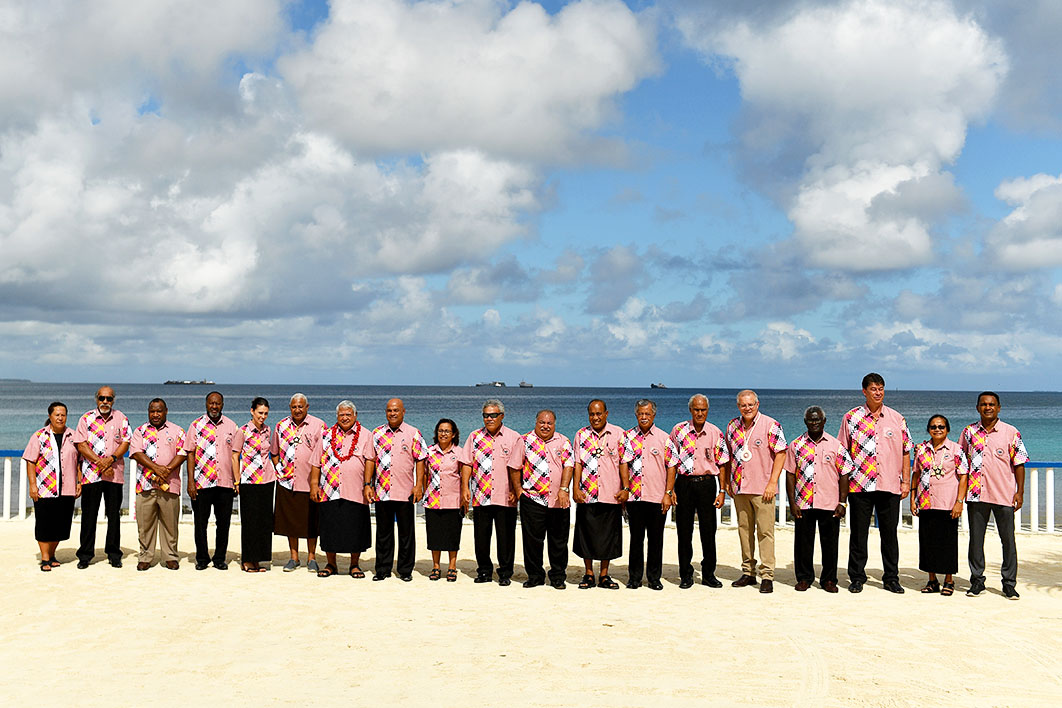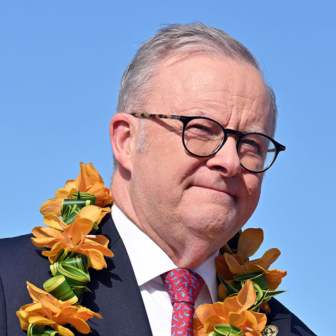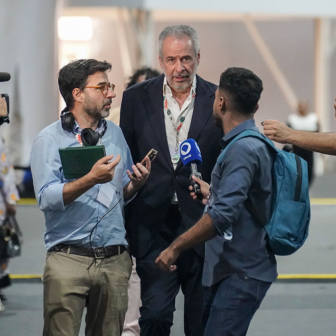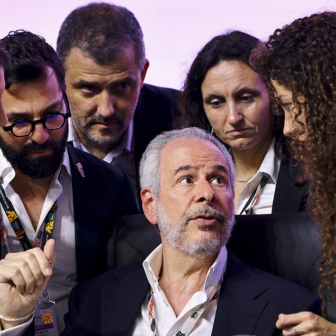For an Australian onlooker, the scene in Suva’s Ratu Sukuna Park last Saturday was touching and a little embarrassing. Hundreds of Fijian families were putting coins and small notes into buckets being passed around as they sat listening to local rock bands performing for free.
Fiji’s ordinary citizens, most of them struggling to pay their own bills, were donating to help Australians hit by our disastrous bushfires. “We’ve raised about F$5000 [A$3800],” a volunteer told me late in the afternoon. Asked why Fijians were so moved, she gave the reply I’d heard from many others: “When Cyclone Winston hit us, Australian aid was the first to arrive.”
The link will be made more explicitly this year as the bushfire crisis subsides. But Fijian leaders are already making the point obliquely. A few days earlier, when prime minister Voreqe (“Frank”) Bainimarama farewelled the fifty-four Fijian military engineers sent to assist the bushfire fight in southeastern Australia, he mentioned that other soldiers were cleaning up from the latest cyclones of the season to cross Fiji islands.
“Today is a proud day to be Fijian, as our nation comes to the aid of the climate-vulnerable on two fronts across Oceania,” Bainimarama said. “As Australians battle the bushfire crisis and Fijians recover from cyclones Sarai and Tino, we are bearing witness to the powerful resilience of the Pacific spirit. I have long said that we are all in the same canoe when it comes to combating climate change.”
His foreign minister, Inia Seruiratu, pressed the point: “As Oceania suffers a new and frightening range of climate-induced disasters, Fiji stands prepared to confront this challenge alongside Australia and all of our Pacific partners by continuing to advocate on the world stage to address the underlying causes of our changing climate.”
My embarrassment partly came from seeing the people of a nation far less wealthy than Australia giving their cash to a country enjoying massive trade and current account surpluses and pretty healthy public finances. But it mainly came from the fact that Australia continues to snub their leaders’ calls for more joint action on the climate change fuelling more ferocious cyclones and bushfires.
Scott Morrison started his prime ministership sixteen months ago with what he called a “Pacific Step-up,” outlined most explicitly at the November 2018 Asia-Pacific Economic Cooperation summit in Port Moresby. Its core was a number of hard-power projects: a new naval base on Manus Island, more island patrols by navy ships, more training with local security forces, efforts to edge Chinese companies out of undersea fibre-optic cabling, and a longer-term scheme with Japan to bring electricity to 70 per cent of Papua New Guinea’s people.
In soft power, Morrison employed his trademark combination of Pentecostal evangelism and blokiness, stressing his Christian faith to leaders of island nations made highly pious by two centuries of missionising, and playing up his enthusiasm for the Cronulla Sharks in a region where Australia’s rugby players, league and union, are household names.
One other plan, to insert Australian commercial TV soaps and gameshows into local channels so we can all grow up watching the same things, has quietly lapsed. Islanders already have what they want of Australian programming, and many of the series he had in mind were not his to place. Moreover, the more remote places say they need shortwave radio, accessible when cyclones knock out power, which would mean reviving a version of Radio Australia; and that would require more money for the ABC, a no-go for the Coalition.
The Step-up went well for a few months, including during a prime ministerial visit to Fiji that seemed to establish a new cordiality with Bainimarama, and official visits to Canberra by PNG’s new prime minister James Marape and the Solomon Islands’ Manasseh Sogovare.
But then came a disastrous performance at the region’s annual summit, the Pacific Islands Forum, in Tuvalu last August. When the island leaders went in hard on climate change, Morrison was either unprepared for the strength of feeling or convinced that his support back in Australia depended on resisting anything more than existing commitments to emissions reduction.
According to Vanuatu’s foreign minister, Ralph Regenvanu, the Australian delegation played it tough in drafting the traditional joint communiqué from the summit. Out went all references to coal, limiting global warming to less than 1.5°C and net zero emissions by 2050.
When pressed by the other leaders, Morrison showed the truculent side of his character so rudely that Bainimarama went public with his frustration. “I thought Morrison was a good friend of mine; apparently not,” he told a reporter from the Guardian. He went on: “The prime minister at one stage, because he was apparently [backed] into a corner by the leaders, came up with how much money Australia have been giving to the Pacific. He said: ‘I want that stated. I want that on the record.’ Very insulting.”
As one Fijian adviser put it: “It was like bringing kava to a session, then when you are all sitting down drinking it, reminding everyone that you paid for it.”
That was not the end of it. Bainimarama has made climate action the hallmark of his continuing prime ministership. To some extent, his advocacy has helped him climb back into diplomatic respectability by transitioning from military-backed ruler to elected leader, and to extricate himself from sanctions that had seen him excluded from the Pacific forum and meetings of the Commonwealth. But it also reflects genuine fear.
On the whole, Fiji is not like the coral-atoll nations, where a rising sea level is the main existential fear from climate change. Although many of its main roads run along sea shores only a metre above high-water, its main islands are craggy volcanic upthrusts, and the government began moving the first of forty-five villages to higher ground five years ago — an emotional business for people leaving behind ancestral burial grounds and abandoning land and foreshores that have provided food for generations.
Then, in February 2016, Cyclone Winston delivered the same kind of shock Australians have just felt from their firestorms. The tropical low moved into Fiji waters and turned westward, hitting the northeast coast of the main island, Viti Levu, with winds of more than 300 kilometres an hour. This was a category five cyclone, the strongest storm ever known to make landfall in the southern hemisphere. It killed fifty-four people, destroyed thousands of homes, ripped up infrastructure, and wrote off a third of Fiji’s GDP.
The fear is that this is the new normal. A cyclone like that hitting the southern “coral” coast of Viti Levu, the strip of resorts and light industries from Suva to Nadi, would set Fiji back for decades.
Bainimarama kept up the pressure on Morrison through the last months of 2019. Meeting in Canberra in September, the pair signed an agreement declaring their common membership of a Pacific vuvale (family), but Bainimarama went on to give a clear message at the Australian War College, noting that friendship requires “a degree of frankness that might sometimes offend but is essential to preserving any relationship.”
“I understand that politics is the art of the possible,” the Fijian PM told the assembled brass and officialdom, who included Morrison’s assistant minister for Pacific affairs and defence, Alex Hawke. “I understand the depth of feeling in coal-producing communities in Australia and the wider economic imperatives at state and federal level. But I also hope that we can eventually find more common ground in our vuvale on the climate issue…
“Millions of Australians — along with their vuvale in the Pacific — are already bearing the brunt of climate change. And as we have seen with the recent Australian bushfires, the ongoing drought and the fact that some Australian cities and towns face severe water shortages, the outlook is worsening.”
It was vital for everyone to “unite behind the science,” he concluded, reminding his audience that the latest report from the Intergovernmental Panel on Climate Change had called for the average global temperature to be capped at 1.5°C above that of the pre-industrial age. “It is a matter of great regret that certain fossil fuel producers have insisted that the IPCC report not be included in the ongoing global climate negotiations. What has been removed from the table must be put back on the table.”
Bainimarama was no doubt inclined to say more, but opted to be a polite guest. Pressed, Morrison and Hawke might have mentioned the A$500 million they had allocated to a new peacekeeping and disaster relief training camp being built near Nadi, and to diplomatic help in having Fiji’s peacekeepers in the Middle East forgiven by the United Nations for blackmarket sales of fuel and cigarettes.
Returning to his theme in December, Bainimarama made poignant calls to protect the oceans while announcing bans on single-use plastic bags and styrofoam containers. “For us, the climate emergency is an oceans emergency,” he said at a Commonwealth climate meeting. Our oceans — and the mangroves, seagrass and kelp fields they contain — are removing massive amounts of carbon from the atmosphere. But the absorption of carbon emissions is coming at a dangerously high price. If reckless levels of global emissions continue, our oceans will more closely resemble lifeless wastelands than the bustling, beautiful ecosystems my generation has sadly taken for granted.”
He also took another shot at Australia. To achieve the 1.5°C limit, the world must cut emissions by half in 2030 and achieve net zero emissions in 2050. “And for the international community to achieve net zero emissions, we must accept zero excuses,” he said. “Frankly, I’m tired of hearing major emitters excuse inaction in cutting their own emissions on the basis they are ‘just a fraction’ of the world’s total… As a retired seaman myself, I can tell you this: You can’t fix a leaky boat with Kyoto credits!”
After the bushfires, Morrison will find it tough to keep words like “coal” out of the next Pacific forum statement. So far, the visible signs of his Pacific Step-up have been prayers, self-congratulation and displays of Australian military power. But the big threats to security in the Pacific are not phantom Chinese military bases; they are things like measles, corruption and climate change. Morrison may have to accept that there is a wisdom here unknown on the Coalition backbenches. In the new Pacific vuvale, it seems, they don’t accept Australia as the father who can always say “no.” •




